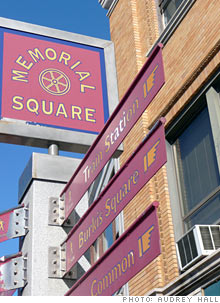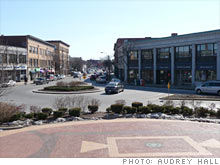In one town, recession helps bridge cultural rift
Framingham's immigrants always felt like outsiders. Then the downturn forced the town's planners and entrepreneurs to work together to save imperiled businesses.
 |
| Framingham street signs in the center of town. |
 |
| A view of Concord Street from the steps of Memorial Hall, where town meetings are held. |
 |
| Members of Framingham's recently-created business owners' association promote their storefronts at the town's Christmas tree lighting ceremony. |
FRAMINGHAM, MASS. (CNNMoney.com) -- The recession has hit Framingham, Mass., like an earthquake, shaking local businesses and thinning their numbers. But the town's merchants have found one silver lining in the economic calamity: It's forcing them to tackle a festering problem.
Culture clashes were easily ignored when the economy was strong. But now, the shops lining Concord Street, Framingham's main artery, can't move forward unless they address the decade-old problems head-on.
Like people all around the U.S., Framingham's residents started feeling the pinch last year, after the housing market began deteriorating. But the town seemed well positioned to ride out the downturn: After being hit hard by the recessions in the early '90s, when Framingham lost 27% of its jobs, the town rose from the ashes and restructured its economy. A statewide program to stimulate job creation in distressed areas worked well in Framingham, turning the town into a thriving business center for companies in a range of industries.
With that growth came a boom in foreign immigrants, drawn to Framingham for the economic opportunities it offered. In a town of 65,000, the 2000 census recorded 4,400 Brazil-born residents. Town planners estimate that 15% to 20% of the current local population hails from Brazil.
Many of the immigrants, such as Pablo Maia, established businesses. Maia opened a real estate company in 1999 to serve the growing Brazilian community, and hired 17 employees to help him run it.
By 2007, Framingham's businesses supported more than 45,000 jobs and a payroll of $3 billion. The town headquarters household names like electronics trendsetter Bose, office-supplies giant Staples (SPLS, Fortune 500), and retailer TJX (TJX, Fortune 500), the parent company behind TJ Maxx and Marshalls. Behind them are more than 2,000 small businesses, each with a handful of employees.
The town's economic diversity should make it resilient. But Framingham's ethnic diversity had caused a schism in the community.
Some are supportive of the town's abundance of Brazilian startups. "The immigrants work really hard and help supply the local economy with a variety of businesses, from bakeries to retail to clothing shops," says State Senator Karen Spilka, who represents Massachusetts's 2nd district.
But many longtime residents worried about illegal immigration. Others were concerned that the downtown area was becoming exclusionary, with signs written only in Portuguese and window displays primarily showcasing Brazilian goods.
"There was a definite disconnect between the Brazilians and Americans. It was a culture gap, which just kept widening," recalls Ilma Paixao, a longtime resident of Framingham and native of Brazil who has studied the dynamic of the Brazilian community at MIT's Department of Urban Studies and Planning.
City planners tried to bridge the gap, but had little success.
"My predecessors made countless attempts to organize and mobilize the downtown merchants, and they were constantly met with failure," says Alison Steinfeld, who assumed the position of director of Framingham's Community and Economic Development office less than a year ago. The town held workshops to help the Brazilian community learn English and sessions to assist them with marketing to Americans, but found little interest.
"We didn't know about the meetings," counters Zalca Nubia Gaseta, who has run Party Flowers on Concord Street with her husband Roberto for the past 12 years. "Maybe that's because no Americans came downtown. To them, it was a scary place. We paid our taxes, so we would have liked the education, but we never got any letter or other type of communication - nothing."
There may have been another reason that the town hall meeting rooms were vacant. "The owners were intimidated to come because they felt they'd just be attacked," says Paixao. "They thought it best to pay their taxes, cause no trouble, and keep their heads down." It's the same reason, Paixao says, that many Brazilian business owners rely on their own cash rather than lines of credits from lending institutions.
That fear wasn't going to go away as long as the economy kept humming. In its own segregated fashion, commerce seemed to be moving forward just fine in Framingham. With the exception of those in the housing industry - such as Maia Realty, which started shedding employees in late 2008 - the businesses on Concord Street didn't yet feel financially pressured.
But as winter settled in, the lack of consumer confidence became apparent. Along the major roads that surround the center of town, large retailers such as Circuit City and Filene's Basement held liquidation sales and prepared to shut down.
Then things got worse. Bose cut its global workforce by 10%. Staples announced that 140 workers would be laid off, including half from its home office. Multicolor, an Ohio company that had a manufacturing facility in Framingham, consolidated its operations into another town and dropped 62 regional employees.
Though Framingham's unemployment rate has remained below the national and state levels, the community is feeling the pain. "We have a solid base," says Senator Spilka. "The economic diversity does help us, [but] we're not recession-proof by any means."
"If you're laid off, you're not buying lunch. It's the multiplier effect in economics. Every dollar works more than once. So as you see layoffs, they will ripple through the community," says Professor Maureen Dunne, who helps run the MetroWest Economic Research Center at Framingham State College's Department of Economics and Business Administration.
That meant bad news for the town's small businesses.
"Small businesses are adaptable, because they can get direct information daily, whereas large businesses have to wait until the end of the month or the end of the quarter for that to happen," explains Dunne. "When restaurants see people aren't coming in Monday through Wednesday, they can move quickly to get them in. They can get feedback immediately by asking customers directly what they want. A lower price? A different menu? Then, they can turn on a heel to address that."
In many towns, that's true. But on Concord Street, it's a little more complicated. Businesses there have had less success implementing new sales tactics in recent months because of the underlying cultural problem. Americans didn't go to the Brazilian stores even when the economy was good. But anecdotal evidence suggests that the Brazilian community - the owners' primary consumer base - is starting to decline in tandem with the economy. The area is not offering them the opportunity it once did.
"A lot of people lost interest and started to go back," says Maia. "It's a rapidly developing country, and there are now many opportunities there today in a way that wasn't the case years ago. So if the economy is bad, they may as well stay in Brazil."
The merchants realized they had a serious problem. Party Flowers owner Gaseta decided to form a business owners' association.
-
The Cheesecake Factory created smaller portions to survive the downturn. Play
-
A breeder of award-winning marijuana seeds is following the money and heading to the U.S. More
-
Most small businesses die within five years, but Amish businesses have a survival rate north of 90%. More
-
The 10 most popular franchise brands over the past decade -- and their failure rates. More
-
These firms are the last left in America making iconic products now in their twilight. More











